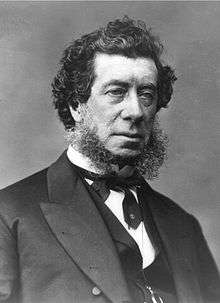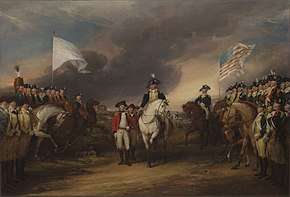Nicholas Fish
Nicholas Fish (August 28, 1758 – June 20, 1833) was an American Revolutionary War soldier. He was the first Adjutant General of New York.[1][2]
Nicholas Fish | |
|---|---|
.jpg) | |
| Adjutant General of New York | |
| In office 1784–1793 | |
| Preceded by | Position established |
| Succeeded by | David Van Horne |
| Personal details | |
| Born | August 28, 1758 New York City, Province of New York |
| Died | June 20, 1833 (aged 74) New York City, New York |
| Spouse(s) | Elizabeth Stuyvesant
( m. 1803; |
| Children | 5, including Hamilton Fish |
| Parents | Jonathan Fish Elizabeth Sackett |
| Relatives | Nicholas Fish II (grandson) Hamilton Fish II (grandson) Stuyvesant Fish (grandson) Stuyvesant Morris (grandson) |
| Education | Princeton University |
Early life
Fish was born on August 28, 1758 into a wealthy New York City family.[1] He was the son of Jonathan Fish (1728–1779) and Elizabeth (née Sackett) Fish (d. 1778).[3] His elder sister was Sarah Fish (b. 1755), who married Terrence Riley.[3]
He attended Princeton University but left before graduating to pursue the study of law at King's College (now Columbia University) through the office of John Morin Scott in New York. There he became actively interested in the organization of the Sons of Liberty.[4]
American Revolutionary War
In 1776 he was appointed by then brigadier general Scott aide-de-camp on his staff.[5] On August 21, 1776 Fish was appointed major of the 2nd New York Regiment.[6]
He served as a division inspector under Major General von Steuben in 1778. He participated in the battles of Saratoga and Monmouth, in Sullivan's expedition against the Native Americans in 1779, and in the Virginia and Yorktown campaigns, in which he served for a time on the staff of the Marquis de La Fayette. Along with Alexander Hamilton, he served in New York Militia Hearts of Oak (1st Battalion/5th Field Artillery Regiment). Nicholas Fish's portrait can be seen at far right bottom row of John Trumbull's Surrender of Lord Cornwallis painting.[7]
Fish was an original member of the New York Society of the Cincinnati and served as its president from 1797 to 1804, and from 1805 to 1806.[8][9] His son, Hamilton Fish, would serve as the Society's President General from 1854 to 1893.[1]
After War Years
In 1786, he was appointed Adjutant general of New York State, which position he held for many years. In 1794, he was appointed by Washington supervisor of the Federal revenue in New York City. On two occasions, Fish ran unsuccessfully for United States Congress, losing to Samuel L. Mitchill in 1804 and Gurdon S. Mumford in 1806. Fish also twice ran unsuccessfully for Lieutenant Governor of New York. In 1810, he was the Federalist candidate, but lost to incumbent John Broome. Broome subsequently died one month into his term in August 1810. Fish ran in a special election for Lieutenant Governor in 1811 to fill the vacancy created by Broome's death, but lost to the then-mayor of New York City, DeWitt Clinton.[10] During the War of 1812, Fish served as a member of the City Committee of Defense.[1]
Personal life

In 1803, Fish was married to Elizabeth Stuyvesant (1775–1854),[1] the daughter of Petrus Stuyvesant and Margaret (née Livingston) Stuyvesant (1738–1818). She was the sister of Peter Gerard Stuyvesant (both descendants of Petrus Stuyvesant the last Dutch director-general of the colony of New Netherland),[11] and the granddaughter of Gilbert Livingston and great-granddaughter of Robert Livingston the Elder.[3] Together, they were the parents of:[12][3]
- Susan Elizabeth Fish (1805–1892), who married Daniel LeRoy (1799–1885).[3]
- Margaret Ann Fish (1807–1877), who married John Neilson (1799–1851).[3]
- Hamilton Fish (1808–1893), who served as New York Governor, United States Senator,[13] and who married Julia Ursin Niemcewiez Kean (1816–1887), sister of John Kean and granddaughter of John Kean.[3]
- Elizabeth Sarah Fish (1810–1881), who married Richard Lewis Morris (1816–1880), the son of James Morris and Helen Van Cortlandt.[3]
- Petrus Stuyvesant Fish (1813–1834), who died young.[3]
Fish died in 1833, and was buried in the churchyard of St. Mark's Church in-the-Bowery in New York City.[1]
Descendants
Through his son Hamilton, he was the grandfather of Nicholas Fish II (1848–1902), a U.S. Ambassador to Belgium and Switzerland, Hamilton Fish II (1849–1936), a Speaker of the New York State Assembly and a member of the U.S. House of Representatives, Stuyvesant Fish (1851–1923), a President of the Illinois Central Railroad who married Marion Graves Anthon (1853–1915).[3], and New York congressmen Hamilton Fish III and Hamilton Fish IV.
Through is daughter Elizabeth, he was the grandfather of Stuyvesant Fish Morris (1843–1928), a prominent physician.[3]
See also
References
- Notes
- "Nicholas Fish papers 1775-1844". quod.lib.umich.edu. William L. Clements Library University of Michigan. Retrieved 15 September 2017.
- Gilman, Daniel Coit; Peck, Harry Thurston; Colby, Frank Moore (1903). The New International Encyclopaedia. Dodd, Mead and Company. p. 433. Retrieved 15 September 2017.
- Burke, Arthur Meredyth (1908). The Prominent Families of the United States of America. Genealogical Publishing Com. p. 385. ISBN 9780806313085. Retrieved 15 September 2017.
- Daughters of the American Revolution (1917). Lineage Book - National Society of the Daughters of the American Revolution. Daughters of the American Revolution. p. 244. Retrieved 15 September 2017.
- Furman, Robert (2015). Brooklyn Heights: The Rise, Fall and Rebirth of America's First Suburb. Arcadia Publishing. p. 65. ISBN 9781626199545. Retrieved 15 September 2017.
- "Nicholas Fish (1758-1833)". www.nyhistory.org. New-York Historical Society. Retrieved 15 September 2017.
- "'Surrender of Cornwallis at Yorktown' (1781) by John Trumbull (1756-1843)". www.grandriveruel.ca. Retrieved 15 September 2017.
- Proper, Rev. Gordon R. (2017). Once Upon a Time in the American Revolution. Xlibris Corporation. p. 467. ISBN 9781524531164. Retrieved 15 September 2017.
- Pierson, George Wilson (1938). Tocqueville in America. JHU Press. p. 136. ISBN 9780801855061. Retrieved 15 September 2017.
- Hess, Stephen (2017). America's Political Dynasties. Routledge. p. 558. ISBN 9781351532150. Retrieved 15 September 2017.
- Chao, Raúl Eduardo (2009). Baraguá: Insurgents and Exiles in Cuba and New York During the Ten Year War on Independence (1868-1878). Dupont Circle Editions. p. 373. ISBN 9780979177743. Retrieved 15 September 2017.
- Saint Nicholas Society of the City of New York (1916). Genealogical Record of the Saint Nicholas Society of the City of New York City. The Society. p. 22. Retrieved 15 September 2017.
- Chisholm, Hugh (1911). Encyclopedia Britannica: A Dictionary of Arts, Sciences, Literature and General Information. University Press. p. 427. Retrieved 15 September 2017.
- Sources
- This article incorporates text from a publication now in the public domain: Gilman, D. C.; Peck, H. T.; Colby, F. M., eds. (1905). . New International Encyclopedia (1st ed.). New York: Dodd, Mead.
